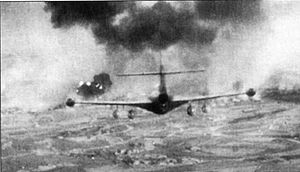This article needs additional citations for verification. (August 2016) |
| 1963 Argentine Navy revolt | |||||||||
|---|---|---|---|---|---|---|---|---|---|
 A naval F9F Panther attacks the army’s 8th armored regiment | |||||||||
| |||||||||
| Government-Insurgents | |||||||||
|
(most of the Army and the Air Force) |
(mainly the Navy) | ||||||||
| Commanders and leaders | |||||||||
| Juan Carlos Onganía |
Federico Toranzo Montero Santiago Sabarots | ||||||||
| Military support | |||||||||
| Most of the Argentine Armed Forces | Part of the Argentine Armed Forces | ||||||||
| Casualties and losses | |||||||||
|
19 dead 22 wounded Several vehicles destroyed[citation needed] |
At least 5 dead 24 aircraft destroyed (mostly on the ground)[citation needed] | ||||||||
| Unknown overall casualties | |||||||||
| History of Argentina |
|---|
 |
|
|
The 1963 Argentine Navy revolt in Spanish called Azules y Colorados (Blues and Colored) was an armed confrontation between elements of the Argentine military that lasted from 21 September 1962 to 5 April 1963. The revolt was attempted by military officers who wanted the government to take a hardline stance against the political participation of Peronist politicians, the culmination of the conflict between Azules and Colorados. The revolt failed to gain much support in the Army and Air Force, and these two branches suppressed the uprising after some fighting that left 24 dead in both sides. The Argentine elections of 1963 proceeded as planned in July and the Navy saw a reduction of its influence.